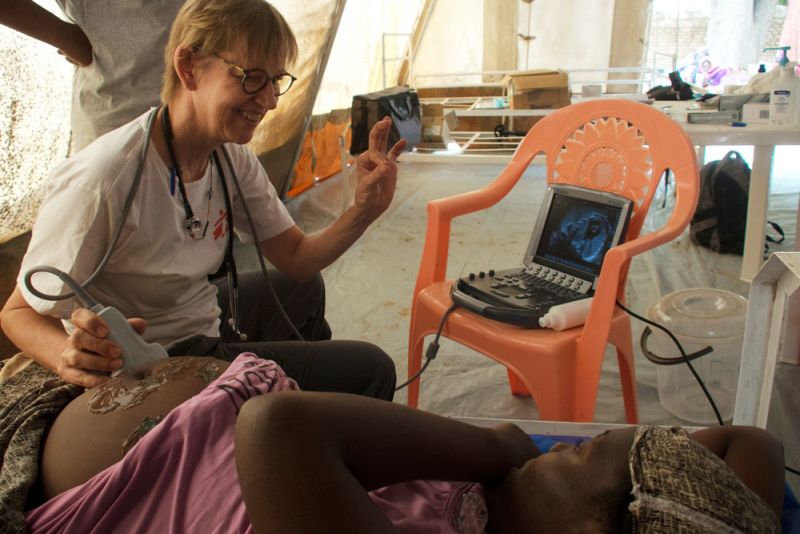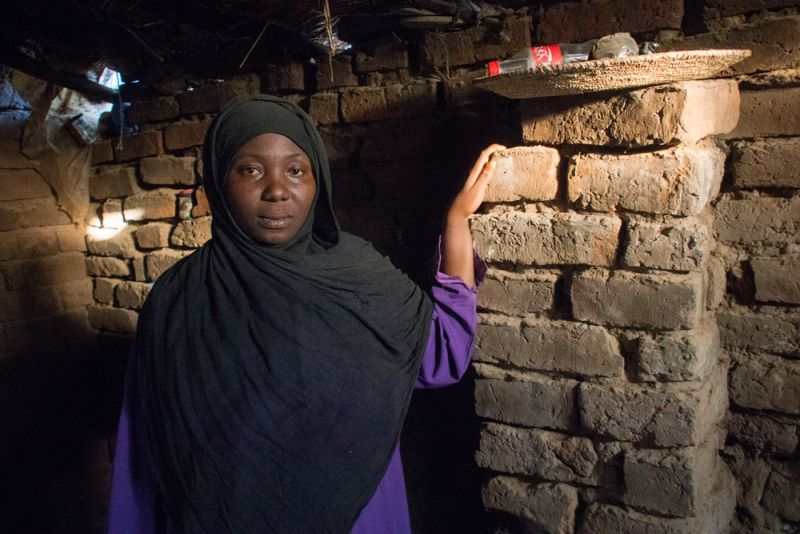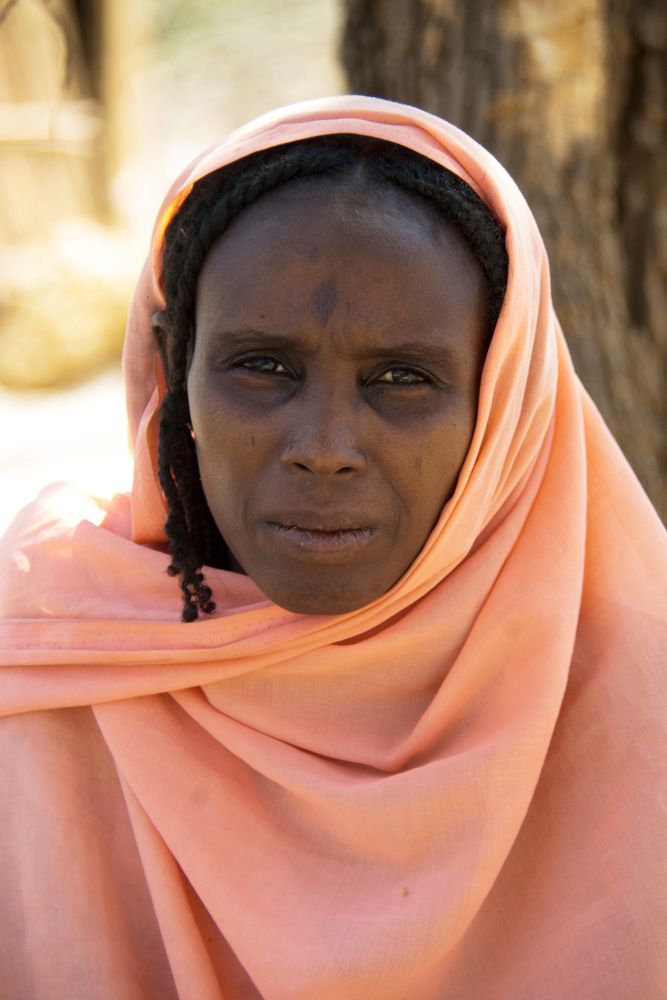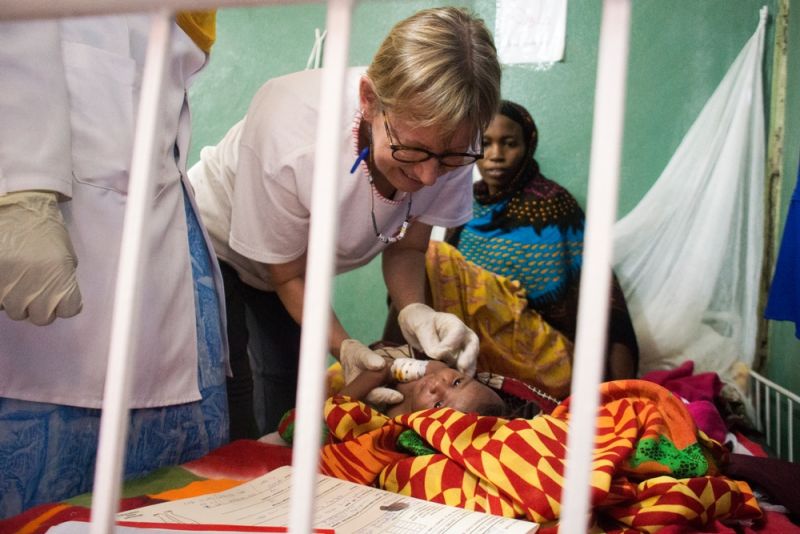In Chad, MSF is fighting a Hepatitis E outbreak - a deadly waterborne disease which is extremely dangerous for pregnant women and their unborn children. This is why MSF sent gynaecologist Veronika Siebenkotten-Branca alongside a team of water and sanitation specialists to its hospital in Am Timan.
It’s full moon in Am Timan, the capital of the Salamat region. The night prayer has started; the only lights are from motorcycles and cinemas where youth are watching football. There’s a persistent noise from small generators and voices of young children playing in the dark. The only road in town is a big red sandy road, in daytime populated by pick-ups, camels, horses, mules and bicycles going by non-stop. Now at night, it’s full of men grilling meat on the fire and the smell of burnt wood is strong in the dusty air.
A calm night
At the end of the big road, just before the big market, the regional hospital appears in the dark. Only the lights of the maternity ward, the neonatal department and pediatrics are illuminating the entrance. People are sleeping in the hospital garden. They’re caregivers: relatives that have come from different corners in the region to be close to their wives, children and old fathers who are hospitalized.
In the neonatal unit, Joel, a Chadian nurse who’s worked with MSF since 2012, is keeping warm a premature twin of 28 weeks with the aid of a lamp. They were delivered with a Caesarean section in the afternoon. He needs to keep the little couple on a constant temperature of 37 degrees. An oxygen machine is helping them to breathe. When their mother arrived at the hospital, she was bleeding profusely. She got a blood transfusion from a family member. In the last few hours, there have been five deliveries.
‘Tonight is a calm night,’ 29-year-old Issa 29 years old) comments. ‘Sometimes we have twelve or thirteen deliveries in one night.’ He’s the only male midwife in the hospital.

Jaundice
Gynaecologist Veronika (58) joined the medical team in Am Timan in November. ‘In September, two pregnant women came in with very yellow eyes and yellowish skin. The two women died very quickly, one after the other. As jaundice points to liver problems, the midwife suspected hepatitis as that is an infection disease of the liver. Blood tests indicated it was hepatitis E. People who are affected can have a mild form: their eyes turn yellow, they feel tired, headache, loss of appetite and vomiting. A bit like when you have a severe cold, but then for up to six weeks. It can disappear after, but for some they get very sick and eventually die.
Dangerous for mother and child
The ones who are most at risk are pregnant women. This has to do with the fact that the liver has to deal with hormonal changes during pregnancy, and the woman’s body having to tolerate another body within herself. Having the hepatitis on top is too much for the liver. One out of four pregnant women infected with hepatitis E will die. So it’s dangerous for the mother, but also for their unborn child. Hepatitis E can result in miscarriage, a premature delivery or for the baby to die while still in the womb.’

Nomads
‘When I arrived, I was welcomed by the team who at the time were preparing a large distribution of hygiene kits with jerry cans and soap to prevent the outbreak to spread any further. The first patient I treated was Miriam. She’s part of a nomadic community, who travel through Chad following the seasons.’ Nomads move with their livestock to find a suitable place for pasture or where customers are. They stop for the growing season to cultivate millets. Finding water along their journey is not easy. Women and girls walk miles at a time to gather water from streams and ponds. They walk the nearly dry riverbed of the Bahr Azoum. The dry season here lasts for about seven months a year. And that river is the only source of water for most of the Am Timan region. This mix of flood plain in the rainy season and a parched wasteland during the dry season, the risk of spreading diseases is high.
Yellow eyes
‘Miriam had been found by our outreach team in Ardo, who are looking for people with an acute jaundice syndrome. Everybody with yellow eyes and meeting a set of criteria would be invited to get tested. A pregnant woman will always be taken to our hospital. Miriam was in the middle of her pregnancy, but luckily she was not very sick. So we kept her in the hospital for a little over a week, to see how it would develop. As she remained stable and her group would stay in one spot for at least one month, which meant our team in the health centre in Ardo could keep an eye on her, we let her return. By now I received news that she is doing well.’
Madina
‘Not all of them are so lucky. Madina gave birth at home, her baby was stillborn. And she didn’t stop bleeding. So they brought her to the hospital. She was so confused; she was only able to tell us her name and could not even remember she was pregnant. After a few days she luckily recovered.’

Treating symptoms
There is no specific treatment or a vaccine for hepatitis E. Thus treatment consists of treating the symptoms. ‘We can give them antibiotics, medication against vomiting, we can treat the fever, but neither here or in Europe, there is anything that you can do to stop the hepatitis. In Europe, if a woman would deliver a child that’s just viable, we would put it in an incubator at the neonatal intensive care unit. And if the mother needs a liver transplantation, she may be able to get it. But that’s not a realistic option here. So what we can do is to observe and hope that with bed rest and the medication we can give, the woman will overcome the hepatitis and that her pregnancy will end positively.’
Frustration
‘We can’t do many lab tests. At times, it’s frustrating we cannot do an accurate prognosis due to the lack of testing possibilities. A test to assess blood clotting factors would give us an idea of how bad the liver is affected and how the illness is developing. If the liver is really badly affected, that can affect the clotting of the blood which would mean a woman could lose so much blood during and after delivery that she can die from it.’
Fear
‘Physically our patients are very tired and weak, they suffer from diarrhoea, fever, epigastric pain, they have no appetite, they vomit. It’s very uncomfortable. And the women are of course very afraid that their child will die. They will constantly be alert for signals that their baby is moving inside their womb.’
Baby beat
Like Hapsita, a 30-year old refugee from neighbouring Central African Republic, she thought her baby was dead. ‘So I brought over the ultrasound and could see the baby beat sign appearing on the screen. She was very happy to discover her baby was still alive. Slowly she was doing better: she could eat, her blood sugar level was stable and her baby was growing. As she lives close to the hospital I decided she could go home, as long as she came back immediately when she showed any of a number of symptoms I explained to her. She was very grateful.’

Impact
‘I go out to the women suffering from hepatitis E every day. To speak to them, to reassure them, but also to talk with them and their family members about the disease. So that when they get better, they will become ambassadors in their community. They can tell other people they were treated well in the hospital: they take you seriously, they are making an effort for you and you go home well. And that will have an impact on the long term. For the people in the villages, and for the nomads. Hapsita has already been in touch with our educational and outreach team. I believe she is definitely someone who will spread the message: “Go to the hospital if you have symptoms, go and seek medical help.”
|
Hepatitis E is common in countries with poor resources and a lack of hygiene when dealing with faeces. The most important therefore to prevent the disease from spreading is to provide safe water and knowledge on how to safely deal with waste management. MSF therefore sent over their emergency team of water and sanitation specialists. MSF teams in Am Timan are making sure that there are enough clean water supplies and are chlorinating water. In ten weeks MSF implemented a programme to chlorinate the town’s water supplies which includes two public water distribution networks and 70 individual water points such as hand pumps, open water tanks and a jetted well site. Over 10 million litres of chlorinated water has been provided in those ten weeks. |
Since September, MSF has treated 885 patients with Acute Jaundice Symptoms (AJS), with numbers increasing to an average of around 60 new cases a week. AJS, which commonly causes the yellowing of the skin and eyes, can indicate a person has hepatitis E. To date, 70 patients have confirmed cases of hepatitis E (HEV RDT+) while 64 have been hospitalized, and 11 have died, including four pregnant women.
Find out more about MSF's activities in Chad.